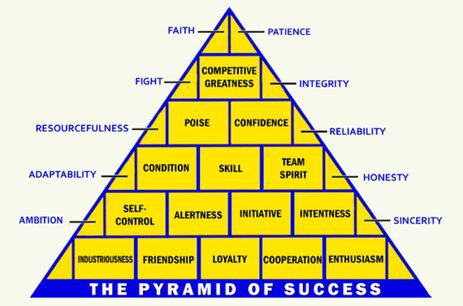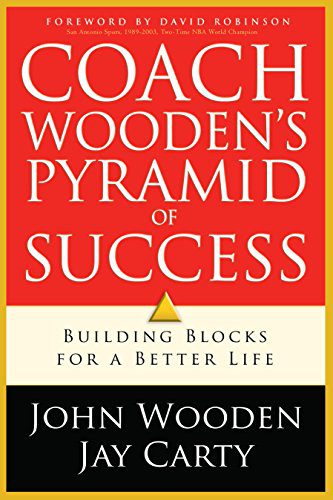Coach Woodens Pyramid Of Success: Building Blocks For a Better Life is based on former UCLA basketball team coach John Wooden’s framework for victory and success in life. The Pyramid reveals that success is built block by block, where each block is a crucial principle contributing to lifelong achievement in every area of life.
Coach Wooden should know a thing or two about the principle of success. His UCLA Bruins team won ten NCAA national championships, seven of them in consecutive years, and had four undefeated seasons, including an 88-game winning streak. John Wooden had a 620-147 record during his 27-year tenure.
The Genesis of Coach John Wooden’s Pyramid of Success
John Wooden’s math teacher when he was a sophomore at Martinsville High School in Indiana was Mr. Lawrence Shidler. Ocsassionally he discussed topics other than mathematics. One day, he instructed his pupils to write a paper defining success. He wanted them to start thinking about the concept of success and whether it just meant getting rich or famous or beating somebody in a ball game.
After completing Mr. Schidler’s homework assignment, John began thinking hard about the concept of success and he has reflected on it for decades. After graduating from Purdue, he continued to be intrigued by the definition of success. He became dillusioned about the definition of success even futher when he entered the teaching and coaching profession. He was baffled by the expectations placed on the students and players under his supervision.

Recalling Dad’s Words
In struggling to find an answer to the question Mr. Shidler had posed years before, I recalled what my dad had constantly tried to get across to us when we were growing up back on the farm: don’t worry much about trying to be better than someone else.
“Always try to be the very best that you can be. Learn from others, yes. But don’t just try to be better than they are. You have no control over that. Instead try, and try very hard to be the best that you can be. That you have control over. Maybe you’ll be better than someone else and maybe you won’t. That part of it will take care of itself.”
What is Success?
in 1934, John coined his definition of success :
“Success is peace of mind that is the direct result of self-satisfaction in knowing you did your best to become the best that you are capable of becoming.”
With inspiration from the ladder of achievement, John got the idea for the Pyramid of Success. He decided that the individual blocks of the pyramid would consist of those personal qualities necessary for achieving success according to his definition of success: peace of mind that is the direct result of self-satisfaction in knowing you did your best to become the best you are capable of becoming.
Building the Pyramid
Each block in the Pyramid was selected with care and consideration of John’s life experiences in and out of the court. John added some of the blocks earlier in his career and updated them as he learned more with time.
The position of each block and the specific order of the tiers of blocks in the Pyramid have great importance, starting with the foundation and cornerstones and building up to the apex: your own personal success.
Building a Solid Foundation for Success
In 1934, John chose two blocks as the cornerstones of his pyramid of success (Industriousness and Enthusiasm). He expanded the blocks after hundreds of hours of reflection over a period of fourteen years.
Industriousness
- You have to work and work hard. There is no substitute for work. Worthwhile things come only from work.
Hard work is essential, and only you really know if you’re giving it everything you’ve got. People who always try to cut corners will never come close to realizing their full potential.
INDUSTRIOUSNESS (HARD WORK)
There is no substitute for work. Worthwhile results come from hard work and careful planning. Industriousness has two components—work and planning.
- Undirected diligence isn’t very efficient; therefore, an element of planning must go into hard work. It is the combination of the two that results in industriousness.
Building Block 2: ENTHUSIASM
Brushes off with those with whom you come in contact. You must truly enjoy what you are doing.
We almost have to force or drive ourselves to work hard if we are to reach our potential. If we don’t enjoy what we do, we won’t be able to push as hard as we need to push for as long as we need to push to achieve our best. However, if we do enjoy what we do, and if we’re enthusiastic about it, we’ll do it better and come closer to becoming the best we can be.
Building Block 3: FRIENDSHIP
Comes from mutual esteem, respect and devotion. Like marriage, it must not be taken for granted but requires a joint effort.
Friendship is doing for others while they are doing for you. It’s called ministry when all of the doing goes one direction. Friendship goes both directions. Friendship is like a good marriage—it’s based on mutual concern. Friends help each other; they don’t use each other.
Building Block 4: COOPERATION
With all levels of your coworkers. Listen if you want to be heard. Be interested in finding the best way, not in having your own way.
Cooperation is working with others for the benefit of all. It is not sacrificing for someone else’s benefit. If what you are doing doesn’t help everyone involved then it is something other than cooperation, perhaps you would call it ministry, service or selfishness.
1) Gentleness is a better method of getting cooperation than harshness is;
2) A team can accomplish much more when it works together than individuals can when they work alone.
Building Block 5: LOYALTY
To yourself and to all those depending upon you. Keep your self-respect.
Loyalty, however, is more than emulating someone’s looks. That is attachment or identification, but the depth of the word “loyalty” comes into play when we add concepts such as devotion, duty, faithfulness and commitment. It’s interesting that these virtues can be given to people, teams, organizations, governments, countries, ideals, rulers, religions and God.
Loyalty is the force that forges individuals into a team. It’s the component that moves teams toward great achievements.
Building Block 6 : SELF-CONTROL
Practice self-discipline and keep emotions under control. Good judgment and common sense are essential.
Self-control is the ability to discipline ourselves and keep our emotions under control. To become our best, good judgment and common sense are essential. No matter the task—whether physical or mental—if our emotions take over, we’re not going to execute near our personal level of competency, because both judgment and common sense will be impaired.
Building Block 7: ALERTNESS
Be observing constantly. Stay open minded. Be eager to learn and improve.
When we aren’t alert we miss opportunities to improve ourselves. If we remain attentive, not only can we improve ourselves, but we can also learn not to repeat the errors of others. We should always watch for circum- stances or situations that can help or harm us and be eager to learn from our encounters.
Building Block 8: INITIATIVE
Cultivate the ability to make decisions and think alone. Do not be afraid of failure, but learn from it Initiative is having the courage to make decisions and take action. People with initiative will act when action is needed.
People with initiative use all the information that they’ve previously acquired in regards to any particular situation, and they act with self-control. People with initiative move forward without fear of failure, even though they might make mistakes or fail.
Building Block 9: INTENTNESS
Set a realistic goal. Concentrate on its achievement by resisting all temptations and being determined and persistent.
Intentness is the ability to resist temptation and to avoid rabbit trails of distraction. An intent person will stay the course and go the distance. He or she will concentrate on objectives with de- termination, stamina and resolve. Intentness is the quality that won’t permit us to quit or give up, even when our goal is going to take a while to accomplish.
Building Block 10: CONDITION
Mental-Moral-Physical. Rest, exercise and diet must be considered. Moderation must be practiced. Dissipation must be eliminated.
By condition, John means physical, mental, moral and spiritual fitness. Specific activities require specific conditioning. Kicking a goal, putting on a green, diving into the ocean, climbing a mountain, operating on a heart-attack victim and cross-examining a witness in a court of law—each of these examples requires different conditioning if the participant is going to be the best that he or she can be.
There is a vast difference between better and best. You may be better than the rest, but you are not a success until you have made the effort to become the best you can be.
Building Block 11 : SKILL
A knowledge of and the ability to properly and quickly execute the fundamentals. Be prepared and cover every little detail.
Skill is knowing what to do and being able to execute all of the fundamentals important to a particular task. However, skill is more than knowledge and execution. A skillful person usually has a sense of timing and the ability to quickly perform the skill.
Proficiency in executing the fundamentals of our craft and learning to do them quickly will go a long way toward making us a success. But to achieve significance, it’s a good idea to select an activity for which God has given us at least a measure of skill.
Building Block 12: TEAM SPIRIT
A genuine consideration for others. An eagerness to sacrifice personal interests of glory for the welfare of all.
Team spirit is the ultimate expression of interdependence. Just as team spirit embraces an element of enthusiasm, it also houses a component of cooperation. But where cooperation makes others better, team spirit makes the group better.
Team spirit is consideration, respect and dignity for others. Patriotism is team spirit in its grandest form
Building Block 13: POISE
Just being yourself. Being at ease in any situation. Never fighting yourself.
When we have poise, we’re not acting, faking or pretending. We’re not trying to be something we’re not, nor are we attempting to live up to others’ expectations. Therefore, when we are being who we really are, we’ll have a greater likelihood of functioning nearer our own level of competency.
Poise keeps us true to ourselves. We’re at ease with ourselves, and as long as we’re at ease with ourselves, we’re going to function nearer to our own ability.
The person with poise is quietly in control at all times because he or she is confident. In fact, a fully prepared person is more apt to be confident. The confidence that comes from thorough preparation and the discipline of self-control usually results in poise.
Building Block 14: CONFIDENCE
Respect without fear. May come from being prepared and keeping all things in proper perspective.
When we are as prepared as we know how to be, and we know that we have the tools to handle most of the unknowns that might come our way, we can go into an event, a job, a meeting, a show or any other venue with total confidence.
Building Block 15: COMPETITIVE GREATNESS
Be at your best when your best is needed. Enjoyment of a difficult challenge.
With competitive greatness, we can deliver our best when our best is needed; at the same time, we can make those around us better, too. A person with this quality loves a challenge—the tougher the better.
The Mortar: Patience and Faith
Patience
Most of us are impatient. As we get a bit older, we think we know more, and things should happen faster. But patience is a virtue in preparing for any task of significance. It takes time to create excellence. If it could be done quickly, more people would do it.
The Apex: Success
The highest point of a pyramid is called the apex. In our Pyramid, it is success. True success is attained only through the satisfaction of knowing you did everything within the limits of your ability to become the very best that you are capable of being.
Success is giving 100 percent of your effort, body, mind, and soul, to the struggle. That you can attain. That is success.
All the best in your quest to get better. Don’t Settle: Live with Passion.



Comments are closed.